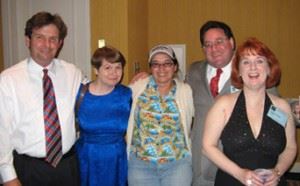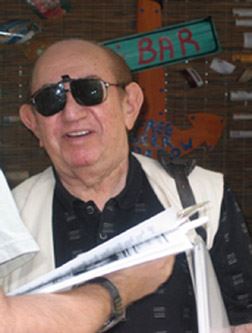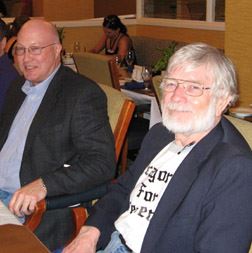

 Since my graduate work at UC Davis, I have been attending academic conferences as a way to develop my professional and service skills. Of all the conferences I have attended, ICFA has proven to be the most rewarding both professionally and personally. I presented my first ICFA paper in 2000. It was my fourth academic conference, and while I had been to the combined Eaton/SFRA conference on the Queen Mary, another Eaton, and a California regional American Studies conference, this was the first time I was going to travel across the country to a conference. Thankfully I had met Mary Pharr (a long time attendee who had held the office of Treasurer in those seemingly mythical times when the conference was fighting to survive) at an Eaton conference, so I knew I would know at least one person there. What I found, however, was there was no reason to worry since ICFA was and is one of the friendliest and most welcoming academic conferences I (and I would venture to say anyone) have ever been to.
Since my graduate work at UC Davis, I have been attending academic conferences as a way to develop my professional and service skills. Of all the conferences I have attended, ICFA has proven to be the most rewarding both professionally and personally. I presented my first ICFA paper in 2000. It was my fourth academic conference, and while I had been to the combined Eaton/SFRA conference on the Queen Mary, another Eaton, and a California regional American Studies conference, this was the first time I was going to travel across the country to a conference. Thankfully I had met Mary Pharr (a long time attendee who had held the office of Treasurer in those seemingly mythical times when the conference was fighting to survive) at an Eaton conference, so I knew I would know at least one person there. What I found, however, was there was no reason to worry since ICFA was and is one of the friendliest and most welcoming academic conferences I (and I would venture to say anyone) have ever been to. This point is exemplified by an experience I had at one of those lovely suite parties on the penthouse floor of the old ICFA hotel in Fort Lauderdale. I was sitting at the table talking to a very nice older gentleman. After he excused himself, calling it a night, another fellow at the table, one of the Wolfes, whom I now believe was the scholar Gary Wolfe, asked me, “Do you know who that man was?” Clearly he knew that I had no idea. And since I rarely know whom I’m talking to at these things I said, “No.” He replied, “That is the man who wrote Flowers for Algernon.” I was, of course, very impressed, having read the story and seen the film version. I said, “That is amazing. I had no idea. He was so friendly.” Mr. Wolfe, as I thought of him then, replied, “This is a very friendly conference.” When I mentioned the other conferences I had been to, he assured me “This conference is much friendlier than any of those,” and now that I have been to a variety of different conferences, I have to say I completely agree. While “Mr. Keyes” and “Mr. Wolfe,” probably don’t even remember this exchange, it is the kind of evening that is a common occurrence at ICFA.
This point is exemplified by an experience I had at one of those lovely suite parties on the penthouse floor of the old ICFA hotel in Fort Lauderdale. I was sitting at the table talking to a very nice older gentleman. After he excused himself, calling it a night, another fellow at the table, one of the Wolfes, whom I now believe was the scholar Gary Wolfe, asked me, “Do you know who that man was?” Clearly he knew that I had no idea. And since I rarely know whom I’m talking to at these things I said, “No.” He replied, “That is the man who wrote Flowers for Algernon.” I was, of course, very impressed, having read the story and seen the film version. I said, “That is amazing. I had no idea. He was so friendly.” Mr. Wolfe, as I thought of him then, replied, “This is a very friendly conference.” When I mentioned the other conferences I had been to, he assured me “This conference is much friendlier than any of those,” and now that I have been to a variety of different conferences, I have to say I completely agree. While “Mr. Keyes” and “Mr. Wolfe,” probably don’t even remember this exchange, it is the kind of evening that is a common occurrence at ICFA.
But being friendly is not the usual measure of an academic conference, though perhaps it should be at least one of the measures. Academic conferences are meant to help scholars present their work, get feedback, and “network.” I have found ICFA a great place for this as well. I have gotten several publications and a post-doctoral teaching position through my participation in the conference. For example, after I gave my first paper, a very polite man came up to me and told me he was J.P. Telotte and that he was in the process of editing a special edition of the Journal of Popular Film and Television. He went on to explain that, with a little refocusing, my paper would fit the issue. Since he didn’t have the final say regarding essay selection, he couldn’t make any promises, but he felt there was a good chance of my essay getting in. However, besides having to redirect the essay a bit, the other “problem” was that he would need the longer, revised version in about ten days. I was surprised, excited, and a little mystified. Mary, who had become a good friend, had come to see my paper and was waiting for me. Moved by the look on my face, I suppose, she asked me what the conversation had been about. Now, I didn’t really know who J.P. Telotte was at the time, but Mary did. When I told her what had transpired she said, “If J.P. Telotte asks you to revise an essay and get it to him, then you do everything you can to do it.” So, that is what I did, and it resulted in my first peer-reviewed publication and a continuing professional relationship with Jay that has proven instrumental in my development as a writer.
I was surprised, excited, and a little mystified. Mary, who had become a good friend, had come to see my paper and was waiting for me. Moved by the look on my face, I suppose, she asked me what the conversation had been about. Now, I didn’t really know who J.P. Telotte was at the time, but Mary did. When I told her what had transpired she said, “If J.P. Telotte asks you to revise an essay and get it to him, then you do everything you can to do it.” So, that is what I did, and it resulted in my first peer-reviewed publication and a continuing professional relationship with Jay that has proven instrumental in my development as a writer.
More importantly, however, Jay, like Mary, has become more than a professional acquaintance; he has become a good friend. And they are not the only friends I have made at ICFA-there are also “the guys from Michigan,” which originally included B.R. Smith, now retired, J. Robert Craig, Ken Jurkiewicz, and though not from Michigan at all, Carrol Fry. I met them all together, and they are a great bunch of folks. Through my association with them, I became and remained actively involved with the Film and Media division of the conference, giving papers and participating in division panels. Rob Craig was the division chair when I started submitting proposals. When he was finishing his fifth year as division chair, he asked me if I would be interested in the position. I was surprised and flattered to be considered. I accepted and was approved “by the Board” to take over for Rob the following year. As I come into my fifth and I believe final year as division chair, and the conference into its thirtieth, I am still amazed at how ICFA, unlike many other conferences, provides both important professional opportunities for students, teaching academics, and writers and an atmosphere that seems to lead naturally to strong and lasting friendships.
Through this conference I have met some “famous” people including Daniel Keyes, Octavia Butler, Peter Straub, Elizabeth Miller, and Nina Auerbach to name only a few. I have also met some folks who may not be quite so well known, but who are incredible just the same, and our friendships have gone beyond the confines of ICFA. We keep in touch through email and on the phone, exchanging work, personal, and family updates. Whenever possible we arrange to see each other at other conferences across the country. These are people who will go way out of their way to help a friend. For example, when I taught for a year at Georgia Tech, thanks to Rob mentioning I needed a job and Jay expediting my application, Mary came up from Florida to help me find an apartment and get settled into her old hometown, Atlanta. These are the kinds of people, experiences, and opportunities that have made ICFA a special conference in the past and, I hope, will continue to make it a unique and welcoming place for another thirty years.
--Susan George